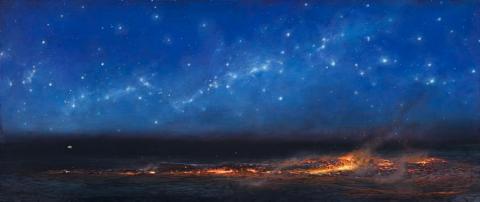THE NIGHT FIRE, 1995
Tim Storrier
synthetic polymer paint on canvas
110.5 x 239.0 cm
signed lower right: Storrier
Deutscher Fine Art, Melbourne
Private collection, Queensland
Tim Storrier: Evening, Deutscher Fine Art, Melbourne, 14 July - 5 August 1995, cat. 4
Crawford, A., Tim Storrier: Evening, Deutscher Fine Art, Melbourne, 1995, p. 15 (illus.)
‘As no other artist, Storrier has encompassed the subtlety of the Australian landscape's fugitive diurnal moods, the silently unfolding vibrancy of its expansive, droning presence. He is an artist who has constantly worked and recorded his most intuitive personal responses to the brooding landmass; the place of his birthright and his ongoing source and subject of creative revisitation.’1
The Night Fire 1995, a consummate example of Tim Storrier's oeuvre, represents the merging of two key themes. Like the celebrated ‘point to point’ paintings of the 1980s, the landscape once more acts a site in which Storrier conducts his alchemic rites of transformation through fire. Though here, the rope has been replaced by glowing embers, alive before vast cold heavens with their blazing whites and somber blues.
Painted in the final years of the last century, Storrier's landscapes from this time suggest a more subdued disposition. As Lumby notes in her monograph on the artist, these evening landscapes ‘announce a more sophisticated exploration of the emotive, melancholic mood that has always haunted Storrier's work - of the themes of isolation and abandonment which he has focused on explicitly in works like Retreat1972, Defence of Indado 1973, and Death of a Warrior 1975. The skies in his nocturnal paintings are an intense cobalt blue, cut back with darker glazes… the landscape here is at once awe-inspiring and threatening, both enveloping and alienating.’2
1. Wright, W., Point to Point, from a speech given at the presentation of a major work to the Australian Embassy, Tokyo, 1996, (at www.storrier.com/html/?page_id=1799)
2. Lumby, C., Tim Storrier: The Art of the Outsider, Craftsman House, Sydney, 2000, p. 142-3
MERRYN SCHRIEVER
